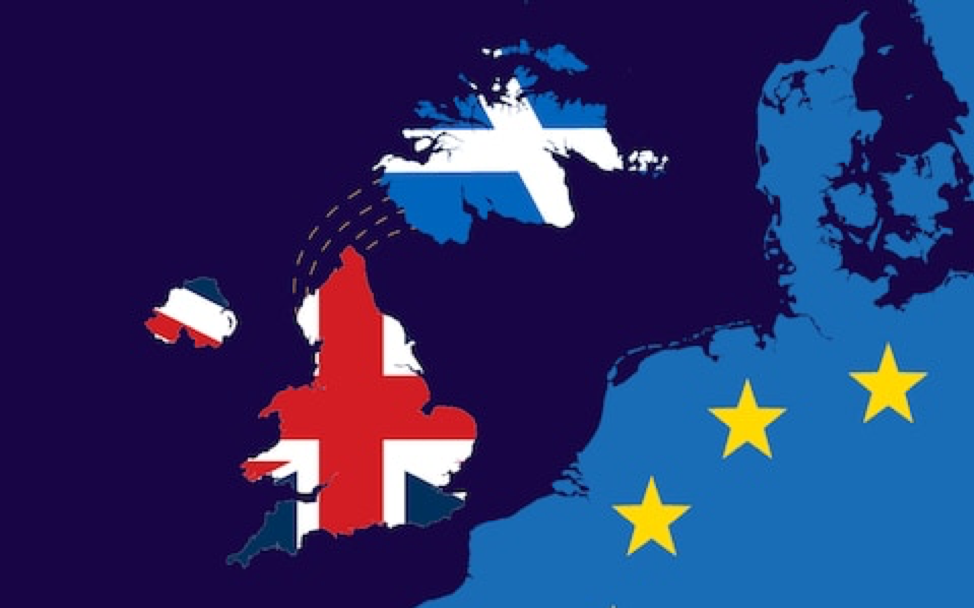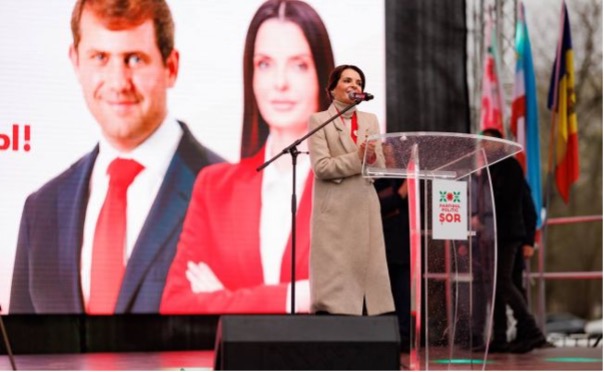Leave a Light On: Scotland’s Future Post-Brexit
Candlelight vigils, somber renditions of Auld Lang Syne, patriotic flags, tear-filled speeches… What I am describing could very well be a funeral, and perhaps in some ways it was…the death of Scotland’s 47-year-old relationship with the EU was a funeral of sorts. While responses ranged throughout the United Kingdom, the scene in Scotland was (for the most part) somber as Scots reflected on their relationship with the EU and, of course, Great Britain.
Scotland’s reaction shouldn’t be a surprise; 62% of Scots voted to remain in the EU during the 2016 referendum. Though some Scots welcomed Brexit, many felt “Scotland (was) torn out of Europe against its will.” Indisputably, the majority of Brexit votes emanated from outside of Scotland. Here’s a handy map from the Independent for reference:
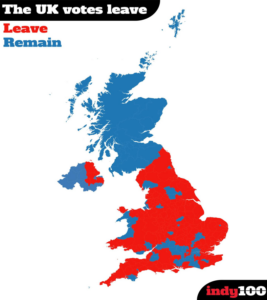
Image from Indy100
In the capital of Scotland, Edinburgh, almost 75% of voters chose remain, and in Glasgow, Scotland’s largest city, 66% of the population voted to stay in the EU. Every single council in Scotland voted remain. Incontrovertibly, Scots chose to stay in the European Union; nevertheless, on January 31st at midnight, Scotland left with the rest of the UK.
Across the North Sea
Leave a Light On, an organization imploring the EU to remember Scotland, met Brexit eve with solemn celebrations. Brussels, clearly felt the same way—leaving a proverbial (or perhaps actual) light on for Scotland at the European Commission:
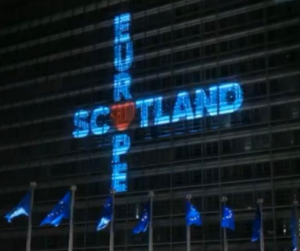
Image from EuroNews
An image, conveniently recreated on Portobello Beach near Scotland’s capital:
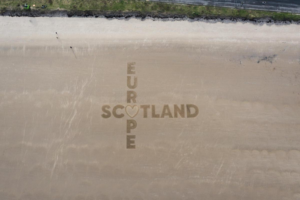
Image from The National Scot
Murmurs point to SNP (the Scottish National Party) as orchestrating the coordinated ‘love-letters;’ nonetheless, the sentiment remains… Scotland and the European Union aren’t ready to say goodbye. The romance doesn’t seem to be one-sided. Donald Tusk, former president of the European Council, has shared his sympathy for the Scottish cause, even going as far as stating: “Sometimes I feel I am Scots. I’m very Scottish now, especially after Brexit.” When asked about the European response to a Scottish appeal to rejoin the EU, Tusk went further: “Emotionally, I have no doubt everyone would be enthusiastic here… there’s a genuine feeling.” But, as open as the EU may be for Scottish membership, the nation has to become an independent country first…
The Start of Something New… Indyref2?
While many Scots want to remain in Europe, the future of Scotland and the EU is inextricably linked to Scotland’s status as an independent nation. Very simply, if Scotland wants to remain part of the EU (or even re-join) they’re going to have to leave the UK. Thus, while Brexit may have severed ties between the European Union and the United Kingdom, for Scotland at least… as the Scottish government’s Brexit minister, Mike Russell, told supporters: “this is the start of something, not the end.”
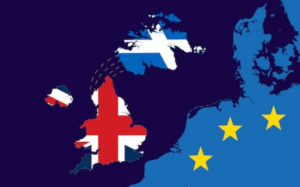
Image from The Telegraph
Membership in the EU was a crucial voting point for many Scots in the 2014 independence election, and now that unity with Britain does not include EU membership, rumors of a new independence referendum seem to materialize on the not too distant horizon.
According to a new YouGov survey on Scottish independence, the nation, for the first time since 2015, is majority (albeit 51%) supportive of Scottish independence. While indyref2 (independence referendum 2) may be, slightly, more likely now, Scottish Prime Minister Nicola Sturgeon, warns there are “no shortcuts” to a new referendum. In a message to SNP (Scottish National Party) supporters in Edinburgh earlier this year, Sturgeon emphasized the party “must focus on building and winning the political case for independence.” Unfortunately, a large part of her “political case” must involve cooperation with British Prime Minister Boris Johnson… something that remains difficult for both parties, especially in the post-Brexit landscape. Whether that is possible remains something to be seen; however, it is clear that independence won’t come in the immediate future… well at least this year.
Thus, while Scotland and the EU may still ‘hold a light’ for each other, Scotland’s relationship with the European Union is predicated by its tumultuous connection with the United Kingdom. Scotland’s membership in the European Union won’t happen overnight… first, comes the long process towards independence.
At least for now, Scotland (like the rest of the world) is mainly focused on curbing COVID-19, and independence remains on the ‘back-burner;’ however, it is foolish to assume this flickering light will fade. Perhaps the UK’s response to coronavirus will illuminate new fractures within the United Kingdom.
Author: Annie Rose Healion


